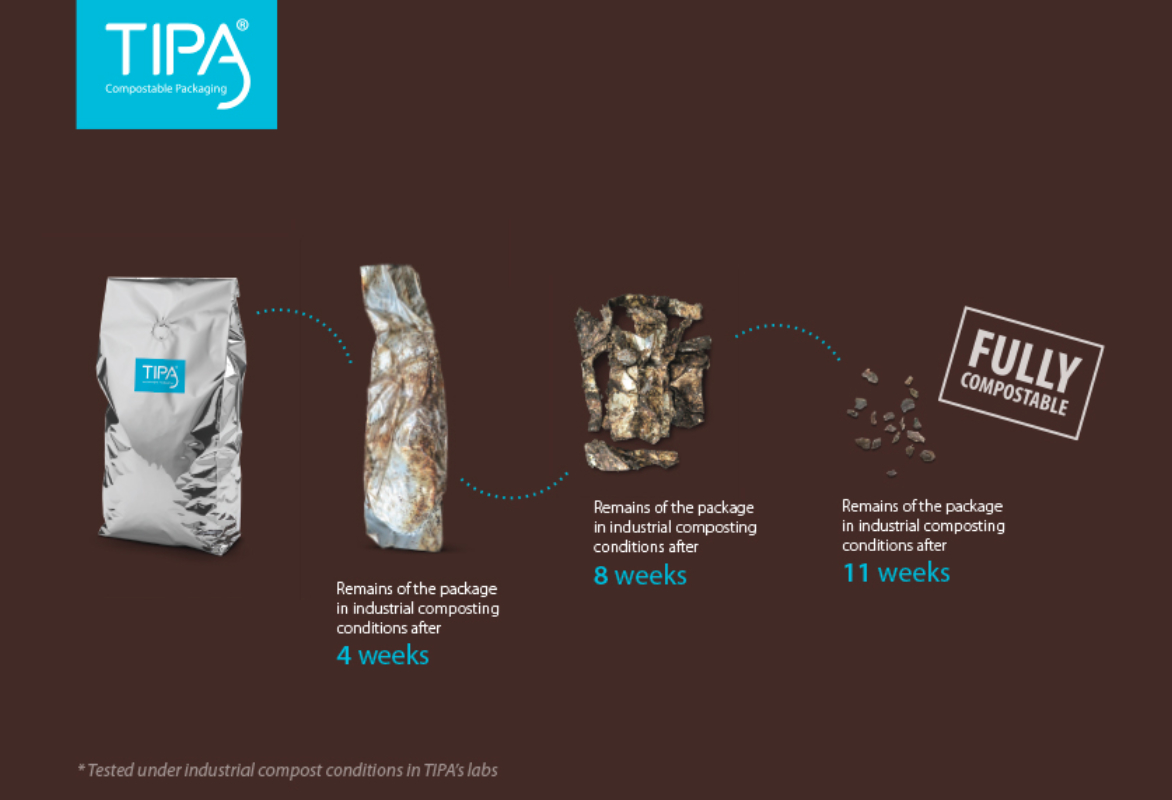HOD HASHARON, ISRAEL — An Israeli start-up has developed durable, transparent and fully compostable flexible packaging for fruits, vegetables and dry and baked foods. The material performs like plastic, but it decomposes like an orange peel.
Entrepreneur Daphna Nissenbaum co-founded TIPA Corp. in 2010 to address the growing problem of single-use plastic waste. Of the estimated 8.3 billion tons of virgin plastic that have been produced globally, nearly 72% has been used only once prior to disposal into landfills, incinerators or open ecosystems, according to research cited by the company.
“The idea sparked from an argument I had with one of my kids about the plastic bottles he would take to school,” said Ms. Nissenbaum, chief executive officer of TIPA. “Some days he would return them to be reused, while other days he wouldn’t. I said to him, ‘We have to think about what we do with our packages.’
“There are so many discussions surrounding the matter of plastic packaging. I thought to myself, ‘The world will need a package that is not based on plastic, one that will break down by itself post-consumption.’ I went out jogging and challenged myself to work out a solution, thinking the idea is somewhere right in front of me. The right things usually happen to be intuitive and natural. The resulting vision was to develop a package that acts just like organic material, like an orange peel, a package that disappears by its own natural composition.”
The multilayer packaging features a blend of polymers that are fully compostable in 180 days. It is designed for industrial compost disposal and some home composting and should be treated like banana peels or any other organic waste, according to the company. Packaging formats include stand-up pouch, bar wrapper, gusseted bag, zipper bag, resealable flap bag, pillow bag, open bag and quattro seal bag, as well as film and laminate rolls.
“Our goal at TIPA has always been to develop fully compostable packaging,” Ms. Nissenbaum said. “Along the way, there were people trying to persuade us to compromise and to make partially compostable, or recyclable products. But even though there was a risk of losing the company, we stuck to our core idea and weren’t swayed by where the industry was trying to push us.”

Brands such as Waitrose & Partners, Stella McCartney and Juste Bio already have adopted TIPA compostable packaging. This past September, the company raised $25 million in a venture capital funding led by Blue Horizon Ventures, Triodos Organic Growth Fund and GreenSoil Investments, bringing total funding to date to $49 million.
“One of the biggest challenges in launching TIPA was finding the right partners who believed in our vision and would be invested in its success, and then building a team that could achieve that,” Ms. Nissenbaum said. “Although some compostable polymers have been in the market for nearly two decades, high-end, certified, fully compostable packaging for food has not been successfully developed until the TIPA goal was set in place. With R.&D. developments that are a result of years of innovative research, TIPA specializes exclusively in compostable packaging.”
Before starting the company, Ms. Nissenbaum was the c.e.o. of the Caesarea Center for Capital Markets and Risk Management at the Interdisciplinary Center in Herzliya, Israel. Previously she held various management positions at a software company. She has a bachelor’s degree in economics and software engineering from Bar Ilan University and a master’s degree in business administration specializing in marketing and entrepreneurship from the Interdisciplinary Center in Herzliya. She graduated from the Israeli Army software engineering program and served in the Israeli Navy software unit as an officer.
“My advice to entrepreneurs in sustainability — or any space — is to open and flexible but always to stick to your vision,” Ms. Nissenbaum said. “There will be a lot of challenges in your journey and a lot of changes on your company’s journey. It’s part of the process. But if you have faith in your vision and your product and the impact it can make on the world, stick to that vision.”




